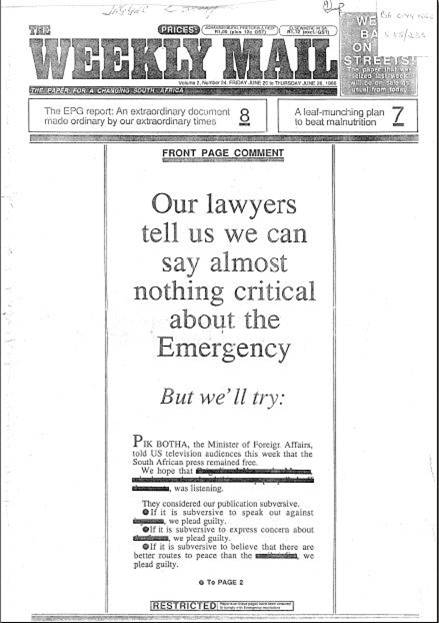Quote of the week
Such traditions that are culturally embedded in the white, male, Afrikaans culture and history, which are the basis of the Nagligte traditions, do not foster inclusion of other groups that must now form the new majority of the SU student body. Wilgenhoffers do not seem to appreciate the negative impact of their culture and rituals on the personal rights of certain individuals. This is because they elevate belonging to the Wilgenhof group above the rights of the individual.
On Freedom Day
South Africa – the democratic teenager — is turning 18 tomorrow. For many this will be just another holiday: time to watch sport on TV or to drink beer and braai some lekker boerewors. Others might actually remember that we are celebrating that special day in 1994 when everything changed (even when nothing much changed for most people). We are celebrating the day when we all suddenly had a whiff of the freedom to be, the kind of freedom that might empower us to contribute to the type of world in which we wish to live.
Today, 18 years later, many South Africans are not free — at least not in the sense that they have access to the necessary financial and human resources to make the kind of life choices that could help them to live meaningful and dignified lives. But it is important to remember how bad things were for most citizens during the apartheid era, not to excuse or justify the excesses and arrogance of some in government today, but to remind ourselves that the glass is at least (still) half full.
I am always amused when I read some of the most outrageous and angry posts on Blogs which accuse our government of almost everything from genocide to Nazism (the latter insult is usually hurled at anyone supporting redress measures based on race, sex or disability). If these posters had written the same kind of thing during the apartheid era they would soon have received a visit from the Security Branch. They may even have been arrested or, worse, would have disappeared, never to be heard of again (or their charred bodies found in shallow graves years later).

During the various states of emergency one would never have known what was happening in the country if one only read the newspapers or — god forbid — watched the propaganda on the SABC news programmes. These were all heavily censored and the SABC actively spread false propaganda as part of its total strategy against what the Nats called the “Total Onslaught”. (How quaint and far removed from reality this kind of fascist language sounds today.)
It was only through whispered conversations and by experiencing the disconnect between what was happening around one and what the papers said was happening, that one could get a sense at all of how vicious and brutal the apartheid state was acting in order to try and repress an ever spreading revolt against the state.
Today it would be unthinkable that our government would announce a State of Emergency, that it would send in the army to suburbs around the country to terrorise the majority of citizens and that it would close down newspapers critical of the government. Goodness knows, for those of us who somehow thought South Africa is a special nation (why I can’t for the life of me remember), our government has been a huge disappointment. We expected so much, only to be confronted by a government run by ordinary politicians. After a few years in power, our government started behaving like people in power in many other parts of the world, instead of like the paragons of virtue and the champions of the poor and the marginalised like they promised us they would.
We are just another developing country struggling with the demons of colonialism — albeit one with lots of potential.
But perhaps, as we celebrate Freedom Day, it is important to remember that living in a fairly normal country where politicians lie and cheat and steal, where most citizens try to make a better life for themselves despite the venality of some of their neighbours and many of the politicians, is not that bad — especially for those of us with jobs and access to food and health care. Although many of us — rather naively, perhaps — hoped for better, the working poor and middle classes — including all the white people moaning and complaining about the country “going to the dogs” — are far better off than we were in 1994 (both economically and in terms of our freedom to live our lives as we please). It is the unemployed who have real gripes with our government, but for the moment there has been no sustained and organised revolt against the revolting greed of the politicians and the business class.
But our Constitution is one of the most magnificent legal documents ever created. The judgments of our Constitutional Court are read and studied across the world and have made a real impact on the lives of many (if not enough) citizens. Civil society seems to be emerging from its post-1994 slumber and is stirring, challenging absurd moves by the governing party like the proposed Secrecy Bill and Traditional Courts Bill.
Despite our giggling President who never did answer the corruption charges against him, despite the racisms and sexism and homophobia that still haunt our land, despite the cesspit of corruption seemingly engulfing our Police Service, many South Africans are getting along with life as best they can. More and more of us are realising that our government is not that special, and that we cannot rely on our government alone to improve our lives, that we have to do it for ourselves.
Siyazenzela!
Happy Freedom Day.
BACK TO TOP

